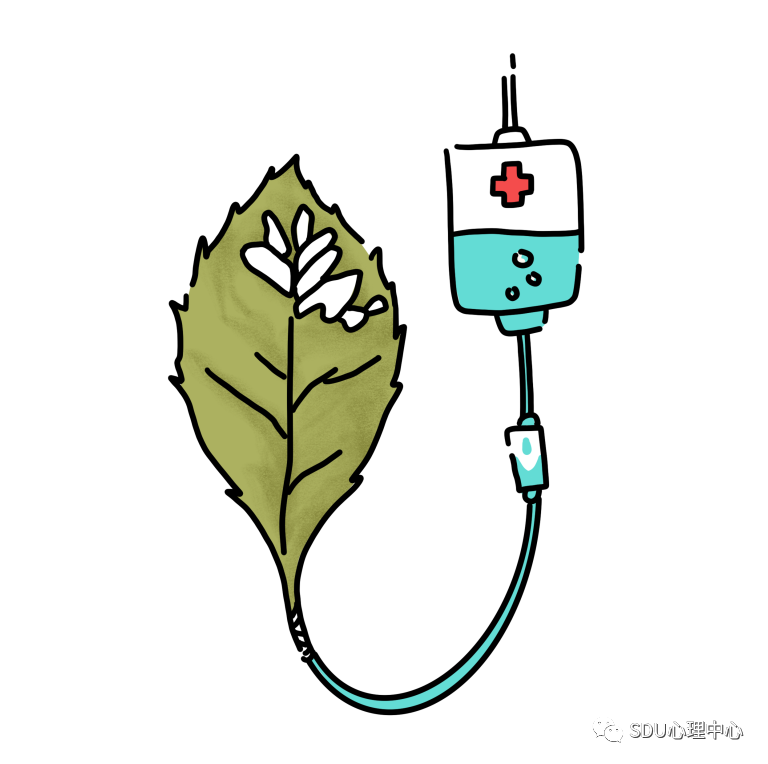We all have experienced some kinds of difficulties, stresses, or adversity in our life, such as failures at school, break-ups of intimate relationship, loss of family members, suffering from illness, and so on. Each change affects us differently, bringing us a flood of thoughts, strong emotions and uncertainty. While some people are trapped into long-term insomnia, less appetite, low mood/depression, and even suicidal thoughts/attempts, some people generally adapt well to life-changing situations and stress. What makes the difference? This can be attributed to resilience.

01 What is resilience?
According to the American Psychological Association (APA), resilience is defined as the process of adapting well in the face of trauma or tragedy, threats or other significant sources of stress (Southwick et al., 2014). But actually the concept of resilience is complex and may have specific meaning for a particular individual, family, organization, society and culture. Besides, resilience is more likely to exist on a continuum that may present itself in differing degrees across multiple domains of life (Southwick et al., 2014). For example, some people may be very resilient in workplace, but not as resilient in their personal life and relationships. Your resilience may also change over time, and the more you learn about resilience, the more potential you have to integrate its concepts into relevant areas of life. So the idea of resilience is relative and depends upon different situations. What are some of the qualities of resilience? In other words, what does a resilient person look like? Two American scholars, Kathryn M. Conner and Jonathan R.T. Davidson (2003) came up with certain characteristics/traits that resilient people have, which may help you better understand this concept. These characteristics may include: viewing change as a challenge or opportunity, recognition of limits to control, engaging the support of others, close and secure attachment to others, personal or collective goals, self-efficacy, past successes, realistic sense of control, sense of humor, action-oriented approach, patience, tolerance of negative affect, adaptability to change, optimism, faith. A resilient person may not necessarily have all the traits above, but should have some of them, which help the person tolerate all the sufferings in life.
02 What are the factors contributing to resilience?
Since resilience varies from person to person, situation to situation, what are some of the factors influencing our resilience? Researchers have identified numerous factors that contribute to resilience. They are called protective factors and can be grouped into three categories: individual, family, and community. Individual factors include emotional regulation, perception of control and ability to impact one’s own life, self-esteem and self-efficacy, ability to dream or having a sense of purpose in life, social skills and communication skills, empathy, sense of humor, physical well-being, higher intellectual capacity and cognitive competencies, easy temperament. Family factors include good parenting, low family stress, sound parental mental health, and so on. Community factors include: supportive extended family engagement, a close relationship with a mentor, positive school experiences, safe neighborhood, close community, other social support, part of religious or faith community, and so on.

03 How to enhance our resilience?
After looking at the factors contributing to resilience, you may have an idea of how to enhance your resilience. But we still want to provide you some practical suggestions. Sydney Ey, Ph.D. an Associate Professor in the Department of Psychiatry at Oregon Health & Science University has developed a Resilience Building Plan worksheet. It can help you strengthen your resilience step by step.
1. Recognize Your Signs of Stress.
a. Where do you feel stress in your body?
b. What are some of the bad habits you engage in when feeling stressed?
2. Focus on Building Physical Hardiness. a. What kind of small changes can you invest in to improve your health? (Better sleep, better nutrition, hydration, exercise, etc.)
b. List one small change you can make now.
3. Strengthen the Relaxation Response – Calm Body and Calm Mind. a. List some activities at home that could help you relax. b. List some activities at work that could help you relax. c. Try out some new relaxation skills such as mind
d. Try some self-soothing activities such as:
i. Tactile (Holding something comforting or soothing)
ii. Smell (Smell of lavender, fresh air)
iii. Visual (Puppy or kitten photos, looking out the window, etc.)
iv. Auditory (Listen to music, listen to sounds of nature)
v. Taste (Drinking some tea, eating chocolate)
4. Identify and Use Your Strengths.
a. Describe a time when you were able to overcome or handle a major challenge in life.
b. What did you learn about yourself?
c. What personal strengths did you draw upon?
d. Draw upon an image of when you were the most resilient.
e. How might you apply this strength now?
5. Increase Positive Emotions on a Daily Basis.
a. Identify sources of humor or joy.
b. Express gratitude, visit someone or write a letter.
c. List your accomplishments.
6. Engage in Meaningful Activities.
a. Notice what happened in your day that was meaningful on a regular basis.
b. What kinds of activities did you find meaningful?
c. Identify activities that put you in the flow. (Enjoyable things you do that cause you to lose track of time.)
7. Counter Unhelpful Thinking.
a. Write down what you are thinking about when you get stressed and then ask: What is the worst that can happen and could I survive it? What is the best that could happen? What would I tell a friend in a similar situation?
b. If you can’t stop thinking about something, write about it a couple of times over a 4-week period for about 15 minutes each time. Notice how your story changes or your perspective becomes clearer each time.
c. If you are being hard on yourself, practice self-compassion and learn to be kind to yourself. Give yourself a mental break or a pat on the back.
d. Remember a hero, a coach or a mentor that encouraged you when you doubt yourself.
8. Create a Caring Community.
a. Connect with friends and family on a regular basis.
b. Identify your sources of support
i. Work
ii. At home.
iii. In the community.
c. Practice good communication and conflict resolution skills.

Last but not least, seek counseling/psychotherapy for help when necessary. Sometimes traumatic things happen and it may totally change our life and our personality. At this time, it may be very difficult to go through it if only depending on ourselves and people around. It is necessary to gradually restore our resilience in the professional setting of counseling/psychotherapy.
Wish you were able to constantly stay calm when facing the adversities in life and stay still no matter how followers bloom and wither, and how clouds roll and spread.
为何有些人更容易走出创伤?你需要发展复原力
我们每个人在一生中都会经历一些困难和压力,比如学业失败、恋爱分手、失去至亲、遭受病痛折磨等。每个生活中的变化都会以不同的方式影响我们,可能会被纷乱的思绪淹没,可能会被强烈的情绪冲击,可能会被未来的不确定性攫住。有的人在面对痛苦时会一蹶不振,长期失眠、食欲不振、心境低落,甚至走向自杀;但也有一些人能够很好地适应生活中的变化和压力,能够通过自我调节恢复到正常状态。那是什么导致了人与人之间的这种差异呢?这主要归功于复原力。
01 什么是复原力?
美国心理学协会(APA)将复原力定义为在面对创伤、灾难、威胁或其他重大压力源时能够适应良好的能力(Southwick et al., 2014)。但其实复原力的概念较为复杂,并且对特定的个人、家庭、组织、社会和文化都有特定的意义。此外,复原力更有可能处于连续谱系中,在不同的生命阶段或领域里表现出不同的程度(Southwick et al., 2014)。例如有些人在工作中的复原力较强,但在个人生活和私人关系中的复原力却没有那么强。而随着时间的推移,你的复原力也会发生变化,并且你对其学习了解得越多,你就越有可能将其融入到你生活的相关领域中,变得越来越具复原力。所以,复原力的概念是相对的,并且视不同情境而定。
那复原力具体包括哪些特质呢?或者说,一个具备良好复原力的人,大概是什么样的呢?两位美国学者凯瑟琳·康纳和乔纳森·戴维森于2003年提出了有复原力的人可能具备的特质,这也许能帮助你更好地了解复原力这个概念。这些特质包括:能将变化视作机遇或挑战、能认识到掌控范围的限度、能得到他人的支持、与他人有亲密且安全的依恋关系、有个人或集体目标、有自我效能感、有既往成功经验、有符合现实的掌控感、有幽默感、做事有行动导向、有耐心、能容忍消极情绪、能适应变化、乐观、有信仰等。有复原力的人不一定具备上述所有特质,但一定具备其中某些特质,这些特质能帮助他们挺过一个又一个生命难关。
02 影响复原力的因素有哪些?
既然复原力因人而异、视情况而异,那都有哪些因素会影响我们的复原力呢?有研究者提出了影响复原力的一些因素,它们被统称为“保护因素”,并可分为三类:个人因素、家庭因素、社会因素。
个人因素包括情绪管理能力、对控制的感知和影响自己生活的能力、自尊水平和自我效能感、梦想与生活意义感、社交和沟通技能、同理心、幽默感、身体健康水平、智力水平/认知能力、气质类型等。
家庭因素包括家庭教养氛围,家庭压力水平、父母精神健康水平等。
社会因素包括外缘家族支持、积极的学校环境、安全的社区环境、关系紧密的社群、其他社会支持等。
03 如何增强我们的复原力?
在了解了复原力的影响因素后,你也许就知道该如何提升复原力了,但还是想在此给出一些实用的建议。俄勒冈健康与科技大学精神病学副教授Sydney Ey博士研发了一份增强复原力计划的工作表,也许可以参考它来逐步提升你的复原力:
1、学会辨识你的压力信号。当你感到有压力时,是身体的哪个部位体验到压力?你通常会做些什么来应对压力?是否有些不良习惯呢?增强对我们自身的觉察,可以在压力来临时及时做出反应,避免陷入恶性循环。
2、打造强健的身体。你可以做出哪些小小的改变来提升你的健康?例如:提升睡眠质量、更有营养地进食、多喝水、做运动等。把这些事情都列下来,并付诸行动。健康的身体是复原力的基础。
3、强化放松反应:平静你的身体和大脑。压力越大,我们越需要让自己保持放松。可以尝试列一个清单:在家里和工作场所分别可以做哪些活动来帮助你放松?尝试一些新的放松技巧,比如正念或冥想。此外,还可以尝试从五感上进行放松、舒缓压力,比如抚摸宠物(触觉)、呼吸新鲜空气/在床头放束薰衣草(嗅觉)、到户外观赏自然万物(视觉)、听音乐(听觉)、喝茶或吃巧克力(味觉)等。
4、发现并运用你的优势。自我欣赏和肯定是重要且必要的,我们需要经常留意自己的闪光点。当你赋闲时,可以思考以下问题:过去生活中你曾经克服了哪些困难或挫折?这个过程是怎样的?你从中学到了什么?是否对自己有了新的认识?是否从中发展出了新的力量?你会如何将这个力量应用到当下?
5、每日增加一点积极情绪。积极情绪也是需要我们主动创造并累积的,可以每天做点事情来维持日常的快乐。比如发现并记录下生活中的点滴惊喜(下午四点洒进屋内的金色夕阳、突然回升的气温等),通过拜访、写信、或电话来表达对他人的感恩之情,列出你过去的成就等。
6、参与有意义的活动。留意生活中让你觉得有意义的事情、能让你身处其中不觉时间流逝的活动(即进入心流状态),有意识地去参加这些活动。
7、挑战你的无益想法。当你感到有压力时,写下此刻你脑海中的想法,并问自己:可能发生的最坏情况是什么,我能应对它吗?可能发生的最好情况是什么?如果是朋友身处相似的处境,我会怎么建议他?如果你无法停止脑海里的想法,那就在一个月的时间里反复地写下它们,每次不间断地书写15分钟,并留意你写下的想法是否有所改变,或者变得更清晰。如果你对自己太苛刻,那就练习自悯,学会对自己更加温和与宽容。
8、营造温暖的社群。经常跟家人和朋友联系,明确你的支持性资源(工作中、家庭中、社区中),练习良好的沟通技巧和冲突解决技巧等。没有人是一座孤岛,社会支持对我们每个人而言都很重要,当我们感到有压力时,良好的社会支持能帮助我们度过难关。
最后再补充一点:除了以上方法外,还可以寻求心理咨询的帮助。有时生活中发生的重大事情可能会改变我们的生命轨迹,甚至扭转我们的个性,这时候单靠自己和身边人可能很难走出,需要在心理咨询的专业设置内逐渐修复创伤,慢慢找回你的复原力。
愿你面对生命中的苦难,始终能淡然以对,闲看庭前花开花落,漫随天外云卷云舒。
Reference:
[1] American Psychological Association, The Road to Resilience (n.d.).
[2] Connor, K.M. & Davidson, J.R.(2003). Development of a new resilience scale: the Connor-Davidson Resilience Scale (CD-RISC). Depress Anxiety. 18(2): 76-82. doi: 10.1002/da.10113.
[3] Southwick, S.M., Bonanno, G.A., Masten, A.S., et. al (2014). Resilience definitions, theory and challenges: Interdisciplinary perspectives. European Journal of Psychotraumatology, 5:25338.
[4] Sydney, Ey,. Resilience Building Plan Worksheet.